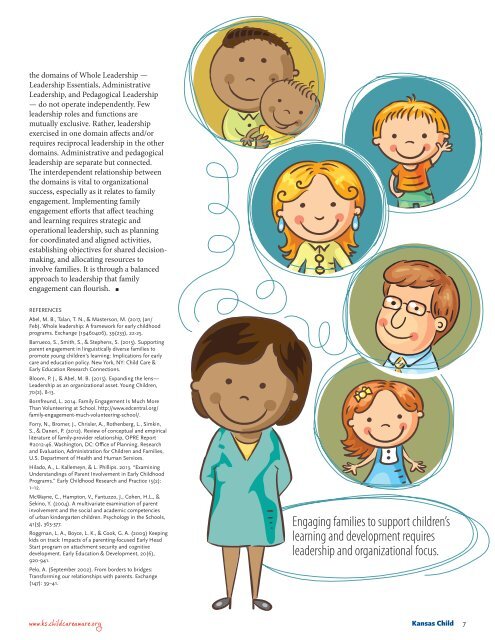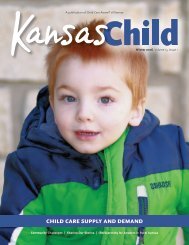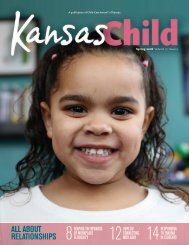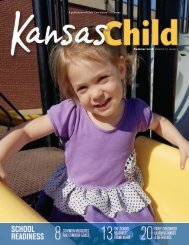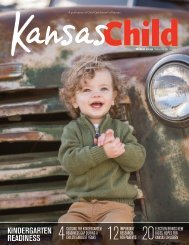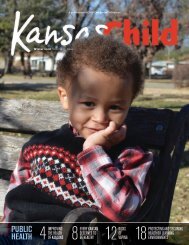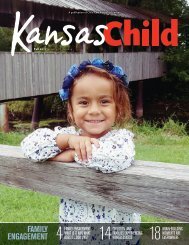2017 Summer Kansas Child
You also want an ePaper? Increase the reach of your titles
YUMPU automatically turns print PDFs into web optimized ePapers that Google loves.
the domains of Whole Leadership —<br />
Leadership Essentials, Administrative<br />
Leadership, and Pedagogical Leadership<br />
— do not operate independently. Few<br />
leadership roles and functions are<br />
mutually exclusive. Rather, leadership<br />
exercised in one domain affects and/or<br />
requires reciprocal leadership in the other<br />
domains. Administrative and pedagogical<br />
leadership are separate but connected.<br />
The interdependent relationship between<br />
the domains is vital to organizational<br />
success, especially as it relates to family<br />
engagement. Implementing family<br />
engagement efforts that affect teaching<br />
and learning requires strategic and<br />
operational leadership, such as planning<br />
for coordinated and aligned activities,<br />
establishing objectives for shared decisionmaking,<br />
and allocating resources to<br />
involve families. It is through a balanced<br />
approach to leadership that family<br />
engagement can flourish. n<br />
REFERENCES<br />
Abel, M. B., Talan, T. N., & Masterson, M. (<strong>2017</strong>, Jan/<br />
Feb). Whole leadership: A framework for early childhood<br />
programs. Exchange (19460406), 39(233), 22-25.<br />
Barrueco, S., Smith, S., & Stephens, S. (2015). Supporting<br />
parent engagement in linguistically diverse families to<br />
promote young children’s learning: Implications for early<br />
care and education policy. New York, NY: <strong>Child</strong> Care &<br />
Early Education Research Connections.<br />
Bloom, P. J., & Abel, M. B. (2015). Expanding the lens—<br />
Leadership as an organizational asset. Young <strong>Child</strong>ren,<br />
70(2), 8-13.<br />
Bornfreund, L. 2014. Family Engagement Is Much More<br />
Than Volunteering at School. http://www.edcentral.org/<br />
family-engagement-much-volunteering-school/.<br />
Forry, N., Bromer, J., Chrisler, A., Rothenberg, L., Simkin,<br />
S., & Daneri, P. (2012). Review of conceptual and empirical<br />
literature of family-provider relationship, OPRE Report<br />
#2012-46. Washington, DC: Office of Planning, Research<br />
and Evaluation, Administration for <strong>Child</strong>ren and Families,<br />
U.S. Department of Health and Human Services.<br />
Hilado, A., L. Kallemeyn, & L. Phillips. 2013. “Examining<br />
Understandings of Parent Involvement in Early <strong>Child</strong>hood<br />
Programs.” Early <strong>Child</strong>hood Research and Practice 15(2):<br />
1–12.<br />
McWayne, C., Hampton, V., Fantuzzo, J., Cohen, H.L., &<br />
Sekino, Y. (2004). A multivariate examination of parent<br />
involvement and the social and academic competencies<br />
of urban kindergarten children. Psychology in the Schools,<br />
41(3), 363-377.<br />
Roggman, L. A., Boyce, L. K., & Cook, G. A. (2009) Keeping<br />
kids on track: Impacts of a parenting-focused Early Head<br />
Start program on attachment security and cognitive<br />
development. Early Education & Development, 20(6),<br />
920-941.<br />
Pelo, A. (September 2002). From borders to bridges:<br />
Transforming our relationships with parents. Exchange<br />
(147): 39–41.<br />
Engaging families to support children’s<br />
learning and development requires<br />
leadership and organizational focus.<br />
www.ks.childcareaware.org <strong>Kansas</strong> <strong>Child</strong> 7


